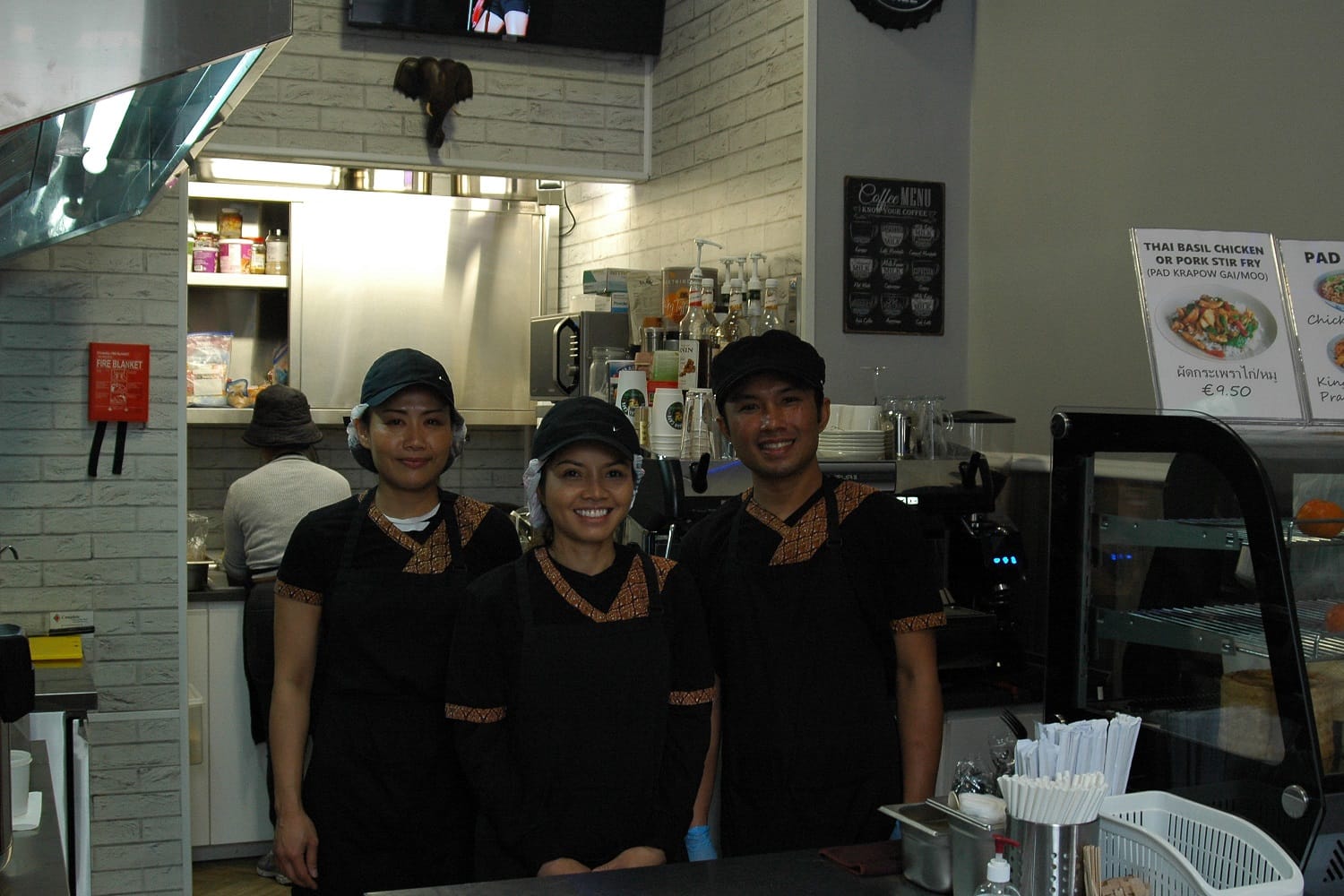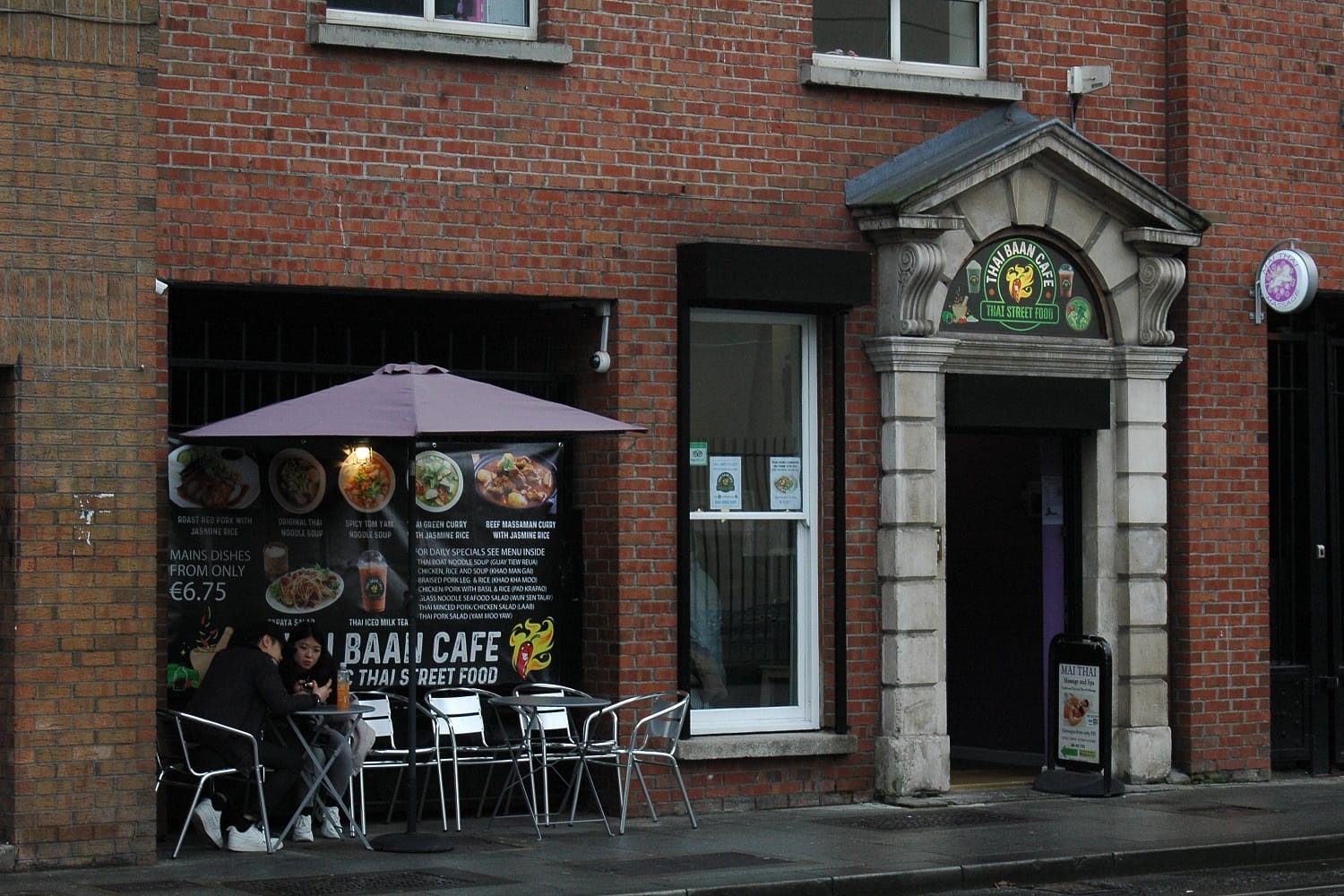What’s the best way to tell area residents about plans for a new asylum shelter nearby?
The government should tell communities directly about plans for new asylum shelters, some activists and politicians say.
From the som tam papaya salads popular in Nakhon Ratchasima – co-owner Salla Maliwoang’s home province – to the green curries of Bangkok.

As the first workday of November wraps up, the Thai Baan Café on Upper Abbey Street is busy with the clatter of woks and sizzle of meat.
The interior is decorated with old metal drinks advertisements, rusted a little around their edges. It is a cosy spot, fitting four customers.
On this grey Tuesday evening, as people step in-and-out, picking up orders for collect, the four stools are occupied by a group of women. They converse in Thai over dishes, including the braised pork leg and beef massaman curry.
Behind the counter, cook Bird Maliwoang readies a Thai iced tea. He stirs a small jug of the steaming dark orange cardamom-flavoured liquid, sweetening it by adding in condensed milk.
His sister, the café’s co-owner, Salla Maliwoang discusses the menu, while in the early stages of cooking up a pork pad Thai.
What she wanted to bring to Dublin were the exact flavours of the different kinds of street food that she loved while growing up in north-eastern Thailand, she says.
Introducing entirely new dishes to the city isn’t what she is looking to do. Her hope is to recreate the tastes from different stalls that she came to know across Thailand, she says, whether that be the som tam papaya salads popular in Nakhon Ratchasima – her home province – or the green curries she enjoyed in Bangkok.
On the Thursday prior to the bank holiday weekend, the café is filled with the sweet scent of marinated pork as it is grilled by Bird Maliwaong.
The pork, served on a trio of skewers, is known as moo ping. Maliwaong had soaked them in a soy sauce with sugar and pepper, he says, giving them an enticingly sticky gleam.
The sweet and savoury marinade is complemented by nam jim jaew, a spicy dip made from fish sauce, chilli, rice powder and green onion.
The meat is from the pig’s neck. Each item on the menu seeks to use a different cut, says Paul Lavelle, the cafe’s co-owner and Salla Maliwaong’s husband.
“You might see pork mentioned everywhere, but it could be neck or loin, chop or steak,” he says. “Each part is suited for something different.”

Lavelle takes pride in pointing out the attention that goes into each dish, while he sits at one of the two tabletops by the café’s window, looking out onto the Luas Red Line.
All of this amuses him too. That he and his wife are in the food business surprises him, he says, because neither he nor Salla intended to set up a café
The space used to be a reception for Salla’s massage parlour next door, he says.
She had opened up her business nine years ago, after training as a massage therapist in Bangkok, according to the parlour’s website.
But once the pandemic hit, demand fell, Lavelle says. “The space wasn’t being utilised to its full potential.”
The couple weighed up their options and decided to create the café. Maliwaong brought her mother over from Thailand, having worked in different restaurants for years, Lavelle says. “And we poached Bird from [his mother’s] restaurant last year.”
The café opened in April, and for Lavelle, he says, his motivation came from a sense of frustration at being unable to find what he considered to be authentic Thai food in Ireland.
He first visited Thailand 25 years ago while en route to work in construction in Australia, he says. “I stopped off for a week.”
Ten years later he went back and met Salla, he says. “She was working in a restaurant, and we’re married now 12 years.”
When they moved back to his home in Celbridge, in Co. Kildare, it wasn’t just a disappointment with the Thai food on menus that hit them, Lavelle says, but also the sheer effort it took to source some ingredients.
Many that they use in the café can’t be bought in Ireland, Lavelle says. “So, I’ll go over there, into the markets and fill suitcases with Thai tea – which you can buy a brand of here, but it doesn’t taste the same – and the stock for the soup.”
The pork soup sets the menu apart, in Lavelle’s eyes, and it is served as the accompaniment to the khao man gai, a dish both he and Bird Maliwaong cite as their favourites.
Khao man gai is a boiled and seasoned chicken breast, served on a rice flavoured with chicken broth and garlic to give it an oily, savoury taste.
Lavelle says it makes an ideal breakfast, with the clear warming soup a good companion for digesting the rice. “They just go so well together.”
By 7pm on the last Saturday in October, Abbey Street is at the darkest point of dusk, and a seat has finally come available in the café.
The Maliwaong siblings tend to a stream of eat-in orders and take-outs, chopping up papaya salads and doling out the noodle soups into bowls.
They greet and chat to customers, already with many on a first-name basis, switching between Thai and English.
In a black t-shirt with golden abstract patterns on the collar, Bird whips around the counter brandishing a plate of khao moo daeng, which is roasted red pork on jasmine rice, and a cup of soup.
The pork has been ladelled in its own gravy and sprinkled with sesame seeds. It is succulent, and when left to sit, increases in its juiciness and tenderness as it absorbs the gravy.
It is a comfort food, a homely taste to some, and a taste of home to others.
Simplicity is what they want, Lavelle says, replicating a food they have all loved elsewhere. “And at the same time, we just want to do a small number of things, not a big menu, and do them right.”

Get our latest headlines in one of them, and recommendations for things to do in Dublin in the other.